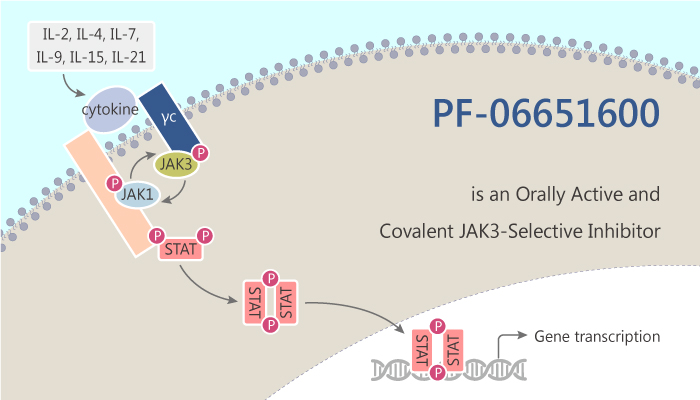JAK/STAT-dependent cytokines are essential for the development, proliferation, and function of T-cells. The JAK family of nonreceptor tyrosine kinases is composed of four isoforms: JAK1, JAK2, JAK3, and TYK2. Functioning in pairs, these enzymes drive signaling through type I/II cytokine receptors. Cytokines play an important role in the induction and regulation of inflammatory and autoimmune diseases. Many of the cytokines involved in autoimmune diseases signal via the Janus kinase/Signal Transducer and Activator of Transcription signaling pathway. Meanwhile, signaling through the six γc cytokines mentioned earlier requires both JAK1. And this associated with various beta chains, and JAK3 associated with a unique γc shared by all six receptors. One important functional difference between JAK1 and JAK3 is the fact that JAK3 is exclusively relevant with the γc receptor chain. While JAK1 is associated with a wider array of receptor chains. PF-06651600 is an orally active, covalent and selective JAK3 inhibitor.

PF-06651600 is an orally active and selective JAK3 inhibitor with an IC50 of 33.1 nM. Specifically, PF-06651600 is highly efficacious in inhibiting γc cytokine signaling, which is dependent on both JAK1 and JAK3. In vitro, PF-06651600 inhibits Th1 and Th17 cell differentiation and function. Besides, in vivo it reduces disease pathology in rat adjuvant-induced arthritis as well as in mouse experimental autoimmune encephalomyelitis models. Importantly, by sparing JAK1 function, PF-06651600 selectively targets γc cytokine pathways while preserving JAK1-dependent anti-inflammatory signaling. Thus, JAK3-selective inhibition differentiates from pan-JAK or JAK1 inhibition in various immune cellular responses. Moreover, it could potentially translate to advantageous clinical outcomes in inflammatory and autoimmune diseases. All in all, PF-06651600 is an orally active, covalent and selective JAK3 inhibitor.
References:
Telliez JB, et al. ACS Chem Biol. 2016 Dec 16;11(12):3442-3451.